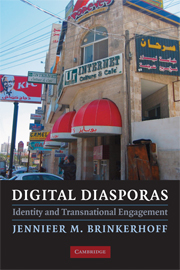Book contents
- Frontmatter
- Contents
- Tables and Figure
- Acknowledgments
- Digital Diasporas
- 1 Introduction
- 2 Diasporas, Identity, and Information Technology
- 3 Keeping the Dream Alive
- 4 Digital Diasporas as Cybercommunities
- 5 Digital Diasporas and Conflict Prevention
- 6 Policy Agendas, Human Rights, and National Sovereignty
- 7 Helping the Homeland
- 8 Digital Diasporas: A New Avenue for Peace and Prosperity?
- Appendix
- Acronyms
- Bibliography
- Index
3 - Keeping the Dream Alive
Published online by Cambridge University Press: 05 June 2012
- Frontmatter
- Contents
- Tables and Figure
- Acknowledgments
- Digital Diasporas
- 1 Introduction
- 2 Diasporas, Identity, and Information Technology
- 3 Keeping the Dream Alive
- 4 Digital Diasporas as Cybercommunities
- 5 Digital Diasporas and Conflict Prevention
- 6 Policy Agendas, Human Rights, and National Sovereignty
- 7 Helping the Homeland
- 8 Digital Diasporas: A New Avenue for Peace and Prosperity?
- Appendix
- Acronyms
- Bibliography
- Index
Summary
This chapter describes two diaspora CGOs and a transnational business founded by a diasporan and targeted to other diasporans. The three cases demonstrate how diasporans may retain ties to and cultivate a homeland-oriented identity at the same time that they negotiate a hybrid identity, inclusive of host country values, with religious (MyCopticChurch.org), political (TibetBoard), and business (Thamel. com) implications. Following a brief discussion of diaspora hybrid identity, I introduce each of the three cases. The chapter closes with an examination of their religious, political, and business implications.
DIASPORAS AND HYBRID IDENTITY
One defining feature of diasporas is an allegiance to and even romanticizing of the ancestral homeland (see, for example, Cohen 1997). That allegiance may be focused on geographic territory, culture, religion, family ancestry, and, sometimes particular political regimes or governments. For some, the idea of returning to the ancestral homeland is the primary focus. However, the notion of a return movement, or the issue of return, does not require an actual intention to return; it may only represent an idealized dream. Safran (1999, 280) differentiates three meanings of return: “(1) instrumental: that is, an active attempt to return as soon as possible; (2) millennial: a return ‘at the end of days’; and (3) intermediate: that is, living in exile, but constantly thinking of the homeland.” Diasporas may romanticize and sustain a homeland identity through different ideologies of return – physical repatriation and cultural return in the case of Africa, and symbolic projections, including membership in a great civilization on the part of Indians (Singh 2001).
- Type
- Chapter
- Information
- Digital DiasporasIdentity and Transnational Engagement, pp. 55 - 84Publisher: Cambridge University PressPrint publication year: 2009



